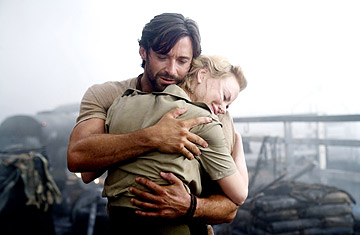
Hugh Jackman and Nicole Kidman star in Baz Luhrmann's Australia
A proud, aristocratic and essentially clueless woman (Nicole Kidman) inherits a failing cattle ranch in Australia's outback. She meets a roughneck drover (Hugh Jackman) with whom she falls into that mutual dislike which, in movies like Australia, is always True Love's necessary precursor. They begin sparking on the adventurous cattle drive that is required to save the old homestead from their rich and avaricious neighbors. She also inherits Nullah (Brandon Walters), an adorable child of mixed white and aboriginal blood, who needs her love but also needs the mystical wisdom of his grandfather (David Gulpilil), a sort of shaman, who stands about the outback, often on one leg, spouting gnomic wisdom (he has the ability to "sing" people he takes a shine to out of trouble). Along the way there are stampedes, fancy dress balls and the beginnings of World War II.
Have you seen everything Australia has on offer a dozen times before? Sure you have. It's a movie less created by director and co-writer Baz Luhrmann than assembled, Dr. Frankenstein-style, from the leftover body parts of earlier movies. Which leaves us asking this question: How come it is so damnably entertaining?
For one thing, it is animated by a sort of irresistible exuberance. Everyone connected with the film acts as if none of their primitive motives and bustling activities has ever been seen before on any screen. Then, too, they seem to have the idea that they're not just making a kind of Down Under western. They're under the illusion that they're making a national epic, a film that symbolically addressed most of the foundational issues with which the Aussies have grappled since the first convict ships dumped their cargoes on the "fatal shore" in the 19th century. This is particularly true of those portions of the story that deal with white Australians' prejudices against the Aboriginals and the need to acknowledge their mystical connection with the land and its ruling spirits. Above all, the movie is driven by conviction. We can, if we wish, sit back and smugly identify Australia's sources, which range from Giant to Red River. Or we can grant these characters their innocence, their implicit belief that all their undertakings are without precedence in this history of popular storytelling.
I recommend the latter course. I love Kidman's spunk and educability. I utterly agree that Jackman is, as People crowned him last week, the "sexiest man alive." Above all, I like the good-natured, hell-for-leather energy of the movie, the sense it imparts that no matter how much its silent-picture villains twirl their mustaches, its good folks, the people who represent the generous spirit of Australia, are going to win out in the end. Somebody is surely going to say that they don't make 'em like this anymore, so let me be one of the first to do so. The history of Australia is infinitely darker, more complex and ambiguous than this movie makes it out to be. I know that director Luhrmann can be a much more self-conscious director — see his insanely pretentious Moulin Rouge! — than he is here. But this movie, appearing at the beginning of the season in which movies ranging from Milk to Revolutionary Road go all sober and morally instructive on us, puts us back in touch with our giddy side, with that old-fashioned, low-minded desire just to know what happens next. There is some elemental human desire — lately largely denied at the cinema — to see pretty people in handsome landscapes assuaging our need for epic romance. On that level, Australia delivers with real panache.
